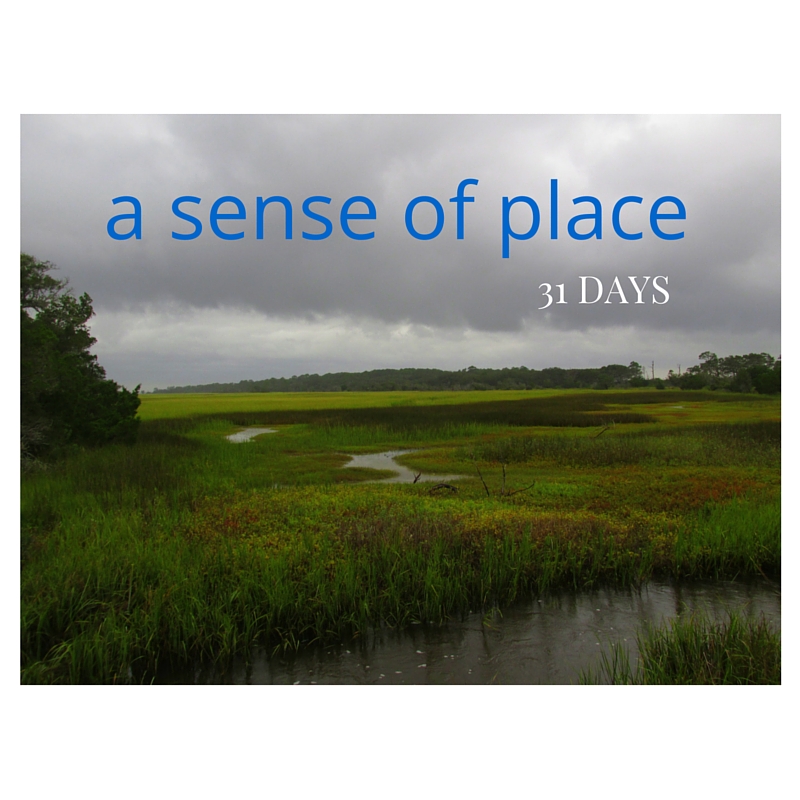 Welcome to Day 2 of 31 Days of A Sense of Place. This project is a bit like Wallace Stevens’ poem Thirteen Ways of Looking At A Blackbird, in that I’m going to write about a sense of place from vantage points that may not obviously connect with each other. I’m not going to attempt to tie them together. In the end, these 31 days of looking at a sense of place may overlap, contradict, form a whole, or collapse like a flan in a cupboard, as Eddie Izzard would say. That remains to be seen.
Welcome to Day 2 of 31 Days of A Sense of Place. This project is a bit like Wallace Stevens’ poem Thirteen Ways of Looking At A Blackbird, in that I’m going to write about a sense of place from vantage points that may not obviously connect with each other. I’m not going to attempt to tie them together. In the end, these 31 days of looking at a sense of place may overlap, contradict, form a whole, or collapse like a flan in a cupboard, as Eddie Izzard would say. That remains to be seen.
*
“It is a pity indeed to travel and not get this essential sense of landscape values. You do not need a sixth sense for it. It is there if you just close your eyes and breathe softly through your nose; you will hear the whispered message, for all landscapes ask the same question in the same whisper. ‘I am watching you — are you watching yourself in me?’ Most travelers hurry too much…the great thing is to try and travel with the eyes of the spirit wide open, and not too much factual information. To tune in, without reverence, idly — but with real inward attention. It is to be had for the feeling…you can extract the essence of a place once you know how. If you just get as still as a needle, you’ll be there.” ― Lawrence Durrell, Spirit Of Place: Letters And Essays On Travel

Durrell is telling us that to absorb, assimilate, imbibe the sense of a place, all we have to do is simply pay attention to it. Use our senses. Be still, want to know it, let it in as it is.
To do this, we need a willingness to be open, to not prejudge a place, or the critters, plants, geology of a place. It means we’re willing to let preconceptions and assumptions drop or go into the background so that we can actually sense — with eyes, ears, nose, mouth, hands and feet — what’s in front of us.
Pema Chödrön talks about “fundamentalism” as based, at its core, on wanting things to be a certain way so that we can breathe deeply. But what if we were to breathe (“softly through your nose” as Durrell advises) as a means of taking in our habitat, the place we’re in, without fear or expectation, without wanting this place to be a certain way, but only because we’re paying attention to its scent, as many other animals do all day and night long?

And the same with our other senses, listening to the sounds that are there (I have heard that some native Americans ask themselves from time to time what seven sounds they can hear, in that moment, as a way to focus attention); looking at the long view, or the forest floor, the tree canopy, the sky, the pond, the ocean, the center of a flower petal, the planted city hellstrip or highway wildflower median; touching leaves and burrs, feeling the sap of pinecones and tree trunks, dipping fingers in the creek, tracing the ridges and smoothness of a seashell, laying in the grass of a park, feeling roots and rocks underfoot; and tasting the snow and rain, eating (known) bramble berries, nibbling an acorn or a salty bit of glasswort.
What if we were just curious?
Chödrön goes on to say that this wanting things to be a certain way is how we humans try to deny our basic groundlessness, the flux and change that is always occurring in our bodies, in our minds, in our lives, among our relationships, in our surroundings, in our built and natural habitats. We tend to view groundlessness — that feeling of being neither here nor there, uncertain, insecure, not in a solid place at all, unsure what’s going on or what’s coming — as the “ultimate threat” to our safety, and we combat it with a fixed mind and heart, with a sense of certainty: I am like this, You are like that, It’s like this. This seems to protect us from what we fear: We feel we have a fix on things, some solid ground.
It’s hard to pay attention to our place, to our habitat and our surroundings, when we feel “ungrounded” … and yet this seems an ideal time, and place, to let the messages from our senses have priority over those from our brains, to concentrate on what it feels like to stand on the ground in this one place, right now.

*
Thanks for checking in. Be sure to see what the other 31 Dayers are writing about.





Lovely pictures!